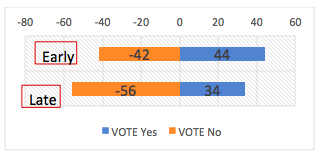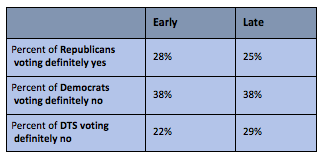Much has been set in motion over the past several weeks about potential repeals of the gas tax and vehicle registration fee increases passed by the legislature and governor this past year.
It doesn’t take a political scientist to understand that many GOP consultants will rightfully use the gas tax issue next year in campaign ads and mailers against their Democratic rivals. I plan to be one of them. And it will be effective.
However, polling casts a dire warning for Republicans who try to use the issue incorrectly. Most notably, polling shows voters feel very differently about actually repealing the tax if they’re told it also means their crumbling roads and bridges won’t be fixed.
The road building coalition that lobbied for SB 1’s passage, recently paid for a poll conducted by renowned GOP pollster Jan van Lohuizen. His statewide survey results clearly demonstrate that the two repeal measures being pushed by dueling Republican candidates for governor will both likely fail and will have zero impact on driving GOP voters to the polls. Zip, nada. Bumpkis.
To quote van Lohuizen:
“Would a gas tax repeal increase GOP turnout: To answer this we told people which offices would be up for election next year and asked them how likely they would be to show up to vote. In a split sampled version of this question we added that a proposition to repeal the gas tax and require a vote on future gas taxes would also be on the ballot. The table below shows results for Republican voters, and show turnout is virtually the same under either scenario:”

Furthermore, it’s worth noting that there has never been a credible study that suggests ballot measures can drive turnout.
The next problem facing a repeal effort is that the ballot measure is not nearly as popular as has been asserted by candidates and consultants backing the measures.
First, there’s a recent Probolsky Research poll earlier in the month that showed the official court-ordered title of the Allen measure starting behind 34.7% yes vs 53.9% no.
The other measure that’s been submitted to the attorney general, and is supported by gubernatorial candidate John Cox, repeals the SB 1 taxes and has the additional twist of requiring increases in gas or car taxes to be approved by voters (why not require a vote then for income, sales and utility taxes?).
There is not a title and summary issued yet by the AG to test on a poll, but van Lohuizen asked the concept twice. In the early ballot, he used the following impartial description of the measure: “It would repeal the gas tax and vehicle registration increase passed this year, and require a vote of the people to approve future increases. Funding for road improvements paid for by these taxes would be cut.”
He used similar language in the “late” vote after simulating arguments against the initiative.
The results show tepid initial support and in fact the measure would clearly likely lose after a campaign.
But worse yet, the measure on the ballot actually draws far more enthusiasm among Democrat voters in much stronger opposition!
Van Lohuizen says:
“We also used the ‘before / after’ design and provided voters with a series of arguments against the proposal and then asked again how respondents planned to vote. The wording we used in the re-ask mostly emphasized the repeal of the gas tax and the vote requirement. That did not change things, the measure would still be defeated by 34% to 56%.”
Early / Late Vote on the concept question:

More relevant to the turnout question are the following two points:
- Enthusiasm among yes voting Republicans is low and does not increase.
- Enthusiasm among no voting Democrats and Decline to State voters is higher and steady.
The following table shows these figures for the late ballot:

Our measure of enthusiasm is simply the percent saying they ‘strongly’ support or oppose the measure. The following table shows these figures for both the early and the late ballot:

If this measure qualifies for the ballot, there will certainly be a $30-$40 million-dollar campaign against it, and this data shows that a “NO” campaign would likely prevail.
This all gets me to my big concern. Gas tax repeals will actually work against Republicans at the ballot next November. It is a false promise being promoted by advocates for both these measures that this is a playbook for November success. And worse yet, a $30-$40 million campaign (focused on turning out Democrats) will surely erode the political utility that now exists of being able to attack Democrats for casting a vote for SB 1.
Interestingly, van Lohuizen also tested another measure that was recently filed with the Attorney General that would provide taxpayer protections to bond and special assessments at all levels of government in California. That concept polled off the charts and has much stronger intensity among GOP voters.
From van Lohuizen:
“We looked at an alternative measure that has been filed by Republican consultants dealing with the dedication of voter approved expenditures. The following table shows that the level of support among Republicans for this measure is much higher than the gas tax repeal measure.”

So what’s the take away? Avoid the repeal measures. They are fools’ errands and will work against Republicans next November in multiple ways. Get behind the taxpayer protection measure and it’s possible it will rally enthusiasm with GOP voters while not raising opposition from Democrats.
Rob Stutzman is consulting for the Fix Our Roads Coalition.

